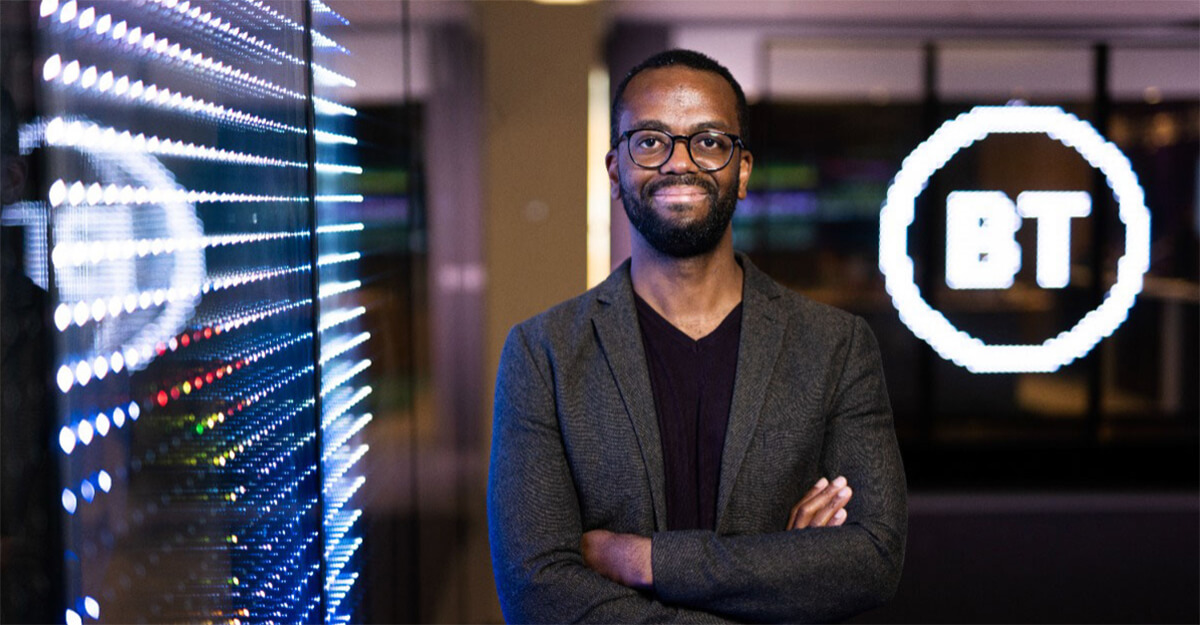We sat down with Afolabi to discuss career progression and the importance of working in a diverse and inclusive environment to reach your full potential.

Tell us about your career with BT Group?
I joined as a Network Engineering Graduate in 2011 - with BT as one of the official communications partners for the London 2012 Olympic & Paralympic Games. I was part of the Mobile and Wireless team that had the challenge of building the largest high-density wireless access network in the world – the first of its kind at the time. I was responsible for the Wi-Fi access coverage design and optimisation for several competition and non-competition venues. I’m proud to say I played a part towards the huge success of the games. What can I say, I had a great start to life with BT Group.
Since then, I’ve worked on many different exciting projects such as the government’s Super Connected Cities initiative where BT Group provided strategic public wireless networks across city centres in the UK. I’ve Ied key aspects of BT’s 4G Femtocell development prior to the acquisition of EE, managed BT’s Wi-Fi CPE test engineering team and championed BT’s Low Power Wide Area Network (LPWAN) Internet of Things (IoT) device strategy. I’m currently a Mobile Services Architect within Network Services.
I’ve also recently been recognised as an Accomplished Engineer with BT, which I take as a reflection of my contribution to the technical community as well as an indication of BT’s investment in my development.
As a Mobile Services Architect what exciting projects have you had the chance to work on?
My role as a Mobile Services Architect is to provide mobile architecture direction to our service platform and wider business teams to enhance our ability to offer the best services to our customers and ensuring we maintain our network leadership in the UK.
I’m responsible for defining our future network architecture to meet emerging business needs through the best application of evolving mobile standards. For this reason, I get to represent and drive BT’s strategic interests at standards fora such as the 3GPP – the global standards specification body for cellular telecommunications. Recently, I successfully coordinated our contribution into the architecture work package definition for the “5G-Advanced” era of mobile specification development. 5G-Advanced is the next evolution of 5G and is seen as the bridge leading to 6G. This was quite a significant activity as it enables us to influence further mobile architecture enhancements and strengthen our position in the global standards community.
How is it working at Adastral Park, BT’s innovation hub?
Adastral Park near Ipswich is a fantastic place to work. I love the campus feel, the green spaces, the cyclist-friendly routes as well as the on-site leisure and sports facilities. It’s the kind of environment I’ve always wanted to work and thrive in.
Its long history with the Royal Air Force (RAF), revolutionary innovation and the many patents that have been realised from the BT Labs on site makes it such a unique technology hub. It has a very healthy ecosystem of companies and academia collaborating to develop cutting edge technology.
The park also gives back tremendously to the community and there’s always opportunities to take part and support these activities. We host science festivals, hackathons, technology conferences, and work experience days for young students. There’s also “Additude” – our Annual Music Festival on site that is attended by family and friends of staff including people in the local area. It’s always a funfair where we raise money to support our chosen charities while having some fun!
What’s your experience as a Black professional in technology?
Every Black professional has their unique experience or perspective of what it’s like working in technology. I typically embrace the opportunity to showcase my cultural heritage and personal brand in my approach to work. In my very early years, this wasn’t the case. I was often tentative in giving an opinion, sharing a unique experience, or speaking up in a room. But when I realised that my colleagues were always very keen to hear my viewpoint on a topic, I came to understand how important diversity of thought was and with this I became more confident. I’ve maintained this mindset ever since – recognising that a range of unique potentials is an important asset for idea generation and effective collaboration.
Why is diversity and inclusion important in a business like BT Group?
I believe that employees of a company should reflect the many identities of the customers that they build products and services for. This way we have a higher probability of getting it right for them.
It’s great to work for a company that promotes a culture that empowers anyone to contribute and belong regardless of your position in the organisation. BT has made concerted efforts with targeted leadership programmes and inclusive workplace policies. Our Ethnic Diversity Network (EDN) is a good example of a support framework within the organisation where diverse communities are celebrated and championed.
I’m always on the lookout for opportunities to give back professionally – making sure I’m visible and available to share my experience where needed or offer mentorship. I’m a strong advocate of continuous professional development and I get a great sense of satisfaction from being an ambassador for career development especially with the work I do with the Institute of Engineering & Technology (IET) promoting professional registration.

